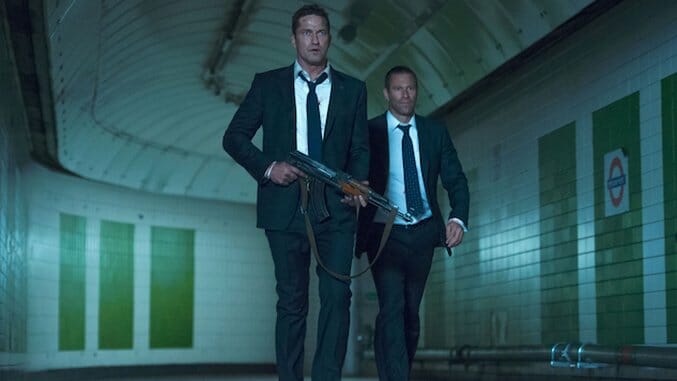
Ah, the 1980s: a time when action movies could be as proudly jingoistic, racist and right-wing as one could want. The turmoil of Vietnam and Watergate had long faded into the rearview; at least, that’s what the massive success of Star Wars suggested after years of American cinema that seemed driven more by angst than fun. Thus the stage was set for films like the Rambo sequels, The Delta Force and so on: films that weren’t afraid to go full-on comic book in its ultra-patriotic us-vs.-them antagonism. Film critics might have turned their noses up at this kind of entertainment, but mass audiences generally ate it up.
To some extent, these trends continued in the action cinema of the 1990s. Die Hard (1988) might have pointed the way toward a relatively more enlightened brand of action cinema, but few of the rip-offs that came in the wake of that genre classic’s success paid much attention to its lessons, borrowing the template but forgoing the intelligence. Then the tragedies of Sept. 11 happened, and the ramifications were immediately seen in Hollywood entertainment. Morally ambiguous protagonists became the norm. One need look no further than Christopher Nolan’s Batman trilogy, with its many perverse suggestions of a perilously thin line between heroes, villains and even the ostensibly innocent civilians in between.
Perhaps mainstream American cinema has finally reached that promised land of guilt-free mindless action entertainment that prevailed in the 1980s, at least if Olympus Has Fallen and now its even more unapologetically appalling sequel London Has Fallen are any indication. In Antoine Fuqua’s 2013 original, the North Korean antagonists were all mustache-twirling villains, and the hero, disgraced former U.S. Secret Service agent Mike Banning (Gerard Butler), wasn’t shy about cracking wise at terrorist foes, John McClane-style, while dispatching them in great numbers. Still, the film remained grounded in something like actual emotional gravity. Babak Najafi’s sequel dispenses with any notions of seriousness entirely. By its last half hour, as Banning prepares to storm his way into a terrorist compound in London, he has long passed into the realm of indestructible-superhuman status, with the added bonus of snarling “fuck” at seemingly every opportunity.
But it’s the film’s gleefully regressive approach toward wanton violence and black-and-white stereotyping that mark this as a return to the heathenish attitudes of old. The villains here are a band of (what else?) Middle Eastern terrorists led by international arms dealer Aamir Barkawi (Alon Aboutboul), so connected to various London cells that he’s able to enlist them all to kill a slew of international heads of state—except for U.S. President Benjamin Asher (Aaron Eckhart)—during a funeral for the U.K.’s prime minister, and then shut the whole city down. The film’s screenplay—written by Creighton Rothenberger, Katrin Benedikt, Christian Gudegast, and Chad St. John—makes one gesture toward nuance within its first 10 minutes, when we witness the U.S. drone strike two years before the film’s main events that injured Barkawi and his son, Kamran (Waleed Zuaiter), and killed his daughter, giving the rest of the film’s proceedings the occasional aura of chickens coming home to roost. (Not even the North Koreans in Olympus Has Fallen were granted such an empathetic gesture.) But though, at one point, President Asher expresses to Banning—who is expecting a baby with his wife, Leah (Radha Mitchell)—his belief in the “golden rule,” he never once evinces any interest in applying it to Barkawi’s case, instead sticking to the usual George W. Bush-era mantra of refusing to negotiate with terrorists.
More troubling than President Asher’s hypocrisy is his complete moral breakdown when it comes to the violence he’s ultimately forced to inflict. Remember that he never saw Banning’s righteous reign of terror in Olympus Has Fallen, being mostly stuck in that White House bunker, his hands cuffed behind his back. Here, though, he finally sees the depths of his cherished Secret Service protector’s depravity, and his first instinct is to blanch. “I’ve never seen a man suffocate,” he says to Banning after he’s fatally knocked the wind out of a baddie; later on, he asks Banning if it was absolutely necessary to knife another terrorist multiple times to death, visibly rattled by the brutality. As convincingly as Eckhart sells such moments of ambivalence, it all gets trashed by the time President Asher kills his first victim and Banning jokingly replies, “I was wondering when you were going to come out of the closet.” It’s a thin thread from the homoerotic implications of that one-liner to, say, the fetishization of John Rambo’s lumpy muscles in Rambo: First Blood, Part II. Welcome back to the 1980s, Hollywood.
Director: Babak Najafi
Writers: Creighton Rothenberger, Katrin Benedikt, Christian Gudegast and Chad St. John
Starring: Gerard Butler, Aaron Eckhart, Morgan Freeman, Angela Bassett, Alon Aboutboul, Waleed Zuaiter,
Release Date: March 4, 2016
Kenji Fujishima is a freelance film critic, contributing to Slant Magazine, Brooklyn Magazine, The Playlist, and the Village Voice in addition to Paste. He is also Deputy Editor of Movie Mezzanine and former editor-in-chief of In Review Online. When he’s not watching movies and writing and editing film criticism, he’s trying to absorb as much music, art and literature as possible. He has not infrequently been called a “culture vulture” for that reason.